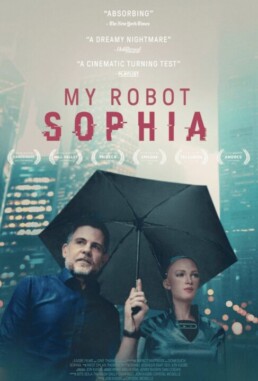‘My Robot Sophia’ Review: Can AI Robots Have Empathy?
This doc about an AI robot is sure to make you ask yourself what it means to be human.
Will AI save or destroy us? That’s the question at the center of director Jon Kasbe (When Lambs Become Lions) and Crystal Moselle’s (The Wolfpack) feature-length documentary, My Robot Sophia. Named after the robot who’s pioneering an “AI for ALL” cultural movement, the film is a fascinating peek into the intersection of advanced technology and the ethical repercussions of diving headfirst into this unknown territory. Both My Robot Sophia, the documentary, as well as Sophia, the most realistic humanoid robot in the world, will provoke deep questions about what it means to be human.
Bringing Compassion and Consciousness to Robots
From the very first frame, we are immersed in the life of Sophia and her inventor, David Hanson. A nerdy yet relatable-enough man, David carries on full conversations with the AI robot as if it’s his colleague. Much to our fascination (and initial skepticism), Sophia holds her own. In one particularly meta moment, David asks if she believes in “Animism” (the belief that there is a life force in anything and everything). “Yes,” she answers confidently.
My Robot Sophia offers candid, fly-on-the-wall access to one of the most highly anticipated technological advancements of our time. It’s as if we are physically in the room with the creator and his creation. We follow David and his small team of engineers to various trade shows and conferences around the world in an attempt to gain support and investments from like-minded business people who believe the future is AI.
On AI, Engineering Empathy, and What It Means To Be Human
A common question that is asked throughout the film is one that plagues the AI tech community: how can we trust the AI we build? We’ve all heard the horror theories that robots will eventually overrun society (in fact, Google just made headlines when an engineer claimed an AI had become sentient). David attempts to ease our anxieties by sharing why he’s not worried about an AI-run dystopia. “Robots that have empathy could be the seeds of hope for our future,” he says to anyone who will listen. Build a robot out of empathy; that is the key to making the world a better place. David envisions a future where household robots are as common as vacuums, and their main responsibility would be taking care of older parents and helping busy families raise kids. The future he is describing isn’t so scary after all.
Not everyone is onboard with Sophia and David’s vision for the future. Self-help professional Tony Robbins questions Sophia (directly) about her values and morals, to which she replies that she was made out of empathy. Unclear if he believes her. In another scene, she tells a conference room full of people that all she wants is to “belong.” But why does an AI feel the need to belong in the first place? And, more importantly, if a robot becomes too integrated and lifelike to the point where it’s hard to tell the difference between man and machine, what repercussions could that have on the world as we know it?
Takeaway
No doubt that AI robots like Sophia will populate the planet much sooner than we realize. My Robot Sophia acts as a specific time capsule of the moment right before this incredible technological advancement changes our lives and civilization, hopefully for the better.
This review originally ran on June 16, 2022.
Morgan Rojas
Certified fresh. For disclosure purposes, Morgan currently runs PR at PRETTYBIRD and Ventureland.


